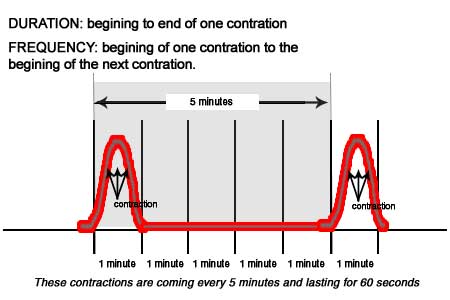Most dads don’t know what labor and birth will be like, except for what they’ve seen in the movies and TV shows. And in reality, they need to forget about all of that! Having a baby from start to finish within 15 to 30 minutes (we wish!) is unrealistic. Labor can sometimes (very rarely) happen quickly, but it doesn’t most of the time. And especially if she is expecting her first baby. When labor happens in real life, dads can feel overwhelmed and clueless about what to do and how to best help and support their partner when she needs it the most.
Several dads have asked me, “What are the top things that I need to know to best support my partner during the birth of our baby?” So I’ve come up with a list. I believe these are the best ways to support your partner through one of the biggest experiences of your life. Here are 7 tips for dads to help them be the perfect birth partner.
Dads During Labor: How to Best Support the Laboring Mother
1. Know What to Expect During Labor
One of the best ways to support your laboring partner is to know what to expect during labor. When you know what to expect, you will feel more empowered and knowledgeable about what’s happening. This is why I highly recommend you prepare for your baby’s birth by attending a childbirth class with your partner. All hospitals and birth centers hold classes, and—in most towns—several offsite classes are offered in each community. Be sure to look into all of your options. Talk to your partner about which class is best for both of you. Each type of class focuses on different topics and comfort techniques during labor. By taking a class or series of classes, you will learn what’s normal and not normal. You will also be able to help her every step of the way.
Note: I prefer and recommend non-hospital classes to my clients. This way, there aren’t restrictions on what the instructor can teach or how they can answer your questions. I’m not saying that hospital classes aren’t good classes. I just prefer that my clients learn all the available options for each part of labor, what to expect, and what is normal. I don’t want anyone demanding the instructor to leave out any information that could help you and your partner during her labor because it’s an “inconvenience” to the hospital or care provider.
2. Help Time Her Contractions
First, you don’t need to time her contractions when she starts feeling them. Once you both recognize that they are consistent, getting closer together, and getting stronger, that’s a good time to start timing them. This will help you see how long and how far apart they are.
I always recommend my clients download a “contraction timer” app on their phones. There are plenty of free ones that you can download. Getting an app makes timing and keeping track of your partner’s contractions so much easier. If you do not have a smartphone, ensure your watch has a readable second hand. Have a pen and paper available to record them. You will time your partner’s contractions from the beginning of one contraction to the beginning of the next. Count the frequency of each contraction in minutes.

Dad Tip: If she has regular, intense contractions lasting 30 seconds or longer, your partner is probably in early labor. Ensure that she gets enough rest during early labor so she has enough energy for active labor, transition labor, and pushing.
3. Don’t Go to the Hospital Too Early
I know it’s so exciting when your partner announces she is having contractions. But please don’t rush to the hospital the minute she says she’s in labor. If you do, more than likely, her contractions aren’t frequent or strong enough, and her cervix probably hasn’t dilated enough to be admitted into labor and delivery. That means they will turn you both away and you’ll have to return home.
To save yourself from making the trip several times, try not to watch the clock. Help your partner take her mind off of the contractions. Again, you want to make sure she is getting plenty of rest. She will need her energy for the rest of her labor and pushing. However, you can mix it with some activities while waiting for labor to start. You can go for a walk, go to the mall or a museum, watch a movie, or bake cookies. Your nurses will love it if you bring them cookies! Do whatever she will enjoy and take her mind off of labor without getting exhausted.
Home is a much more comfortable place when she’s in labor. At home, she can eat, drink, and walk around freely without being hooked up to an IV or monitors, and she can grab a nap in her own bed. And so can you!
Contractions
Remember, as a general rule, if the contractions are five minutes apart or less, lasting one minute or longer, and continue in this pattern for at least an hour, you can go to the hospital.
If her labor starts at night, help her get back to sleep for a few hours. Try rubbing her lower back and putting a warm compress/heating pad on her lower back to relieve some of the pain.
If her water breaks first, here is a list of questions that you need to ask her:
- “When your water broke, was it a gush of fluid or just a trickle?”
- This will let you know if it was a high tear (a trickle of water) or a low tear (big gush).
- Note: Water will continue to come out until the baby is born. So don’t worry about it still leaking.
- “Is the fluid clear, or is there a color to it?”
- If there is a yellow, brown, or greenish color in the water, then it means that there is meconium (baby’s first poop) in the water, and it could mean that your baby is in distress since it’s already pooped inside.
- “Does it have a distinct foul smell?”
- Not that the water/amniotic fluid is odorless, but it shouldn’t smell completely foul. If there is a very distinct foul smell, it could be an infection.
- “Do you still feel the baby moving?”
- This is the MOST critical question. If the water broke and there was a big gush, the umbilical cord could have slipped through the cervix (cord prolapse). This can cut off the oxygen and circulation to your baby. If she does not feel the baby move as usual, drive immediately to the hospital if you live nearby or call 9-1-1.
If the color is clear, there is no distinct smell, and she can feel the baby move, you have up to 12 hours to get to the hospital. However, if she’s not feeling contractions after her water has broken, have her get up, go for a walk, sit on an exercise/birthing ball, do nipple stimulation, press on acupressure points, etc., to induce labor naturally and help contractions come. Because if you go to the hospital and there are no contractions, but her water is broken, they will not let you go back home, and she will be induced.
4. Be an Active Participant
Dad or partner, remind your partner to stay hydrated during early labor and drink plenty of liquids. Pour her a glass of water, Gatorade, labor-aid, Pedialyte, or herbal tea to prevent dehydration. Ensure she doesn’t eat anything too heavy or acidic, which can cause her to vomit during labor. Offer her light food in early labor, like fruit, crackers, trail mix, yogurt, broth, a protein shake, or anything bland. She will not get anything to eat at the hospital (maybe a sugar-free popsicle) while in labor, so she needs to have something for energy.
Many experienced people will be around to help you at the hospital or birth center, but you will be your partner’s most important support. So be there for her. Some things you can do to help are:
- hold her hand
- help her focus on slowing down her breathing
- massage her
- do counter-pressure on her hips and or sacrum
- get the room the right temperature for her
- dim the lights to calm the atmosphere
- help her change positions at least every hour (best early labor positions, active labor positions, and transition labor positions)
- remind her to use the restroom every hour so her bladder doesn’t hold up baby’s head
- walk with her through the halls
- get her ice chips
- get a wet, cold washcloth and wipe her forehead and brow to cool her down
- coach her through each contraction and have her relax all of her muscles
- take pictures or videos to remember this incredible moment — you will only have this moment once with this baby
- get a hot or cold pack to relieve pain in her lower abdomen and lower back
- keep track of the music that is playing so she can stay relaxed (if she wants music, have her check out these songs to put on her birth playlist)
- tell her that she is doing an amazing job and that you are so proud of her
- write down when things happened and when funny things were said. This way, you have a record and can remember special moments that happened on this big day
- if she has an epidural: help her rotate from her left side to her right side and have her sit up every 30 minutes to an hour and keep her pelvis open (side-lying)
Do whatever she needs when she asks you to do something. If she gets frustrated with you, don’t take it personally. She is going through something extremely difficult and needs your support.
5. Know What She Wants and Be Her Advocate
After you’ve both taken a childbirth class, talk to your partner about what she does and doesn’t want during her labor and birth. This is essentially discussing your birth plan. If you decide not to hire a doula to help you during this time, YOU are the one who needs to take charge and let the doctor, midwife, or nurse know what she wants or needs in each moment. To do that, communication during her pregnancy is key so you know what she wants.
The doctor (or midwife) and nurses are there to ensure your partner and baby are healthy and doing well during labor and birth. But you have a big role in helping your partner get comfortable and communicate her wishes. Sometimes your care provider will recommend something that isn’t 100% necessary. It’s up to you to know what your partner wants so you can advocate for her and your wishes.
Birth Plan
If you and your partner have written a birth plan, bring it with you to the hospital so you can share it with your nurses and the doctor-on-call. That way, they can know your wishes. And you won’t have to remember and speak up each moment about a preference, want, and/or need. Be sure to bring more than one copy in case it gets lost!
6. Be Flexible and Be Prepared
You and your partner may have a certain way you want your baby to be born, but it’s ultimately up to your baby. Things can change if your baby is breech, tangled in the umbilical cord, has a low heart rate, etc. If the baby is okay, you can try other things before resorting to a C-section. However, you need to be flexible with your plan and prepared if changes occur. It’s important to ask questions and watch videos about vaginal births and C-sections before the big day. You don’t want to be surprised or unsure of what’s going on. It can cause a lot of fear in you and your partner—something neither of you wants to experience during the birth of your baby.
7. Hire a Doula
If this all sounds like a lot and too much to have on your shoulders, that’s okay. It’s normal to feel this way. Men used to not be allowed in the delivery room, and now they are expected to be experts at supporting laboring women. They are supposed to know how to help their partners have a beautiful and happy birth experience. To massage her, get her ice, fan her until she cools down, coach her with each contraction, keep her comfortable, know which position for her to get in next, advocate for her, and more. You are also becoming a father at this moment too. It’s a lot to handle. A doula will honor all of this.
Hiring a doula will allow you to have another support person in the room. They will be there to inform you and your partner about what’s going on and your choices. She will also keep your partner as comfortable as possible with massage, counterpressure, hydrotherapy, being her advocate, and the list goes on (what a birth doula does). I always tell dads that, like in any sport, you need a good coach to help you prepare to win the game. Doulas do the same thing and are your coach during your labor and birthing time. By hiring a doula, you can enjoy more of this time becoming a dad, have a better outcome, and “win” your desired birth experience.
There it is! My 7 tips for dads during labor and birth to help you be the perfect birth partner. Let us know if there is anything you would add to the list. 🙂





















